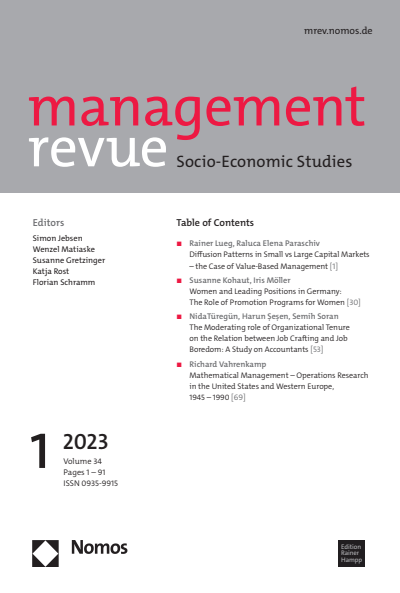新的工作安排-概念和理论的回顾
IF 1.7
0 MANAGEMENT
引用次数: 1
摘要
自从弗里思约夫·伯格曼(Frithjof Bergmann)对新工作(1994;例如,移动设备以及虚拟通信与合作已经进入商业世界,并带来了新的经济,敏捷的工作流程,新的雇佣关系,领导风格,共同工作工具以及增强的空间和时间灵活性(请参阅Aroles等人,2019)。本期关于“新工作安排”的特刊是为了修订和完善基本概念和理论,以解释这些突破性的发展。当我们在2019年底呼吁提交时,我们的主要观察是,关于工作和领导力的研究一直忽视了技术在组织工作中的普遍存在(Orlikowski & Scott, 2017)。我们认为,这些工作方法和组织的变化是如此深刻,以至于需要重新审视普通的理论和概念,看看它们是否仍然公正地应对变化的情况。此后不久,世界遭受了COVID-19全球大流行的打击。对社会接触和流动性的相应限制(无论是否愿意)促进了虚拟协作和通信工具的广泛使用,以及考虑到员工私人生活的各种需求和职责的灵活工作安排(例如,在家上学)。许多以前无法想象的事情(例如,视频会议代替商务旅行,灵活的移动工作或家庭办公形式)已被证明对公司和员工都是有益的。因此,在西方工业化国家2019冠状病毒病危机后的“新常态”中,似乎很明显,许多新方法将得到维持。重新审视新工作的形式,以及相关的挑战和机遇,现在比以往任何时候都更加重要。本文章由计算机程序翻译,如有差异,请以英文原文为准。
New Work Arrangements — A Review of Concepts and Theories
Much has changed since Frithjof Bergmann’s seminal thoughts on New Work (1994; 2004): For example, mobile devices as well as virtual communication and cooperation have entered the business world and have brought forth a new economy, agile work processes, new employment relationships, leadership styles, co-working tools, and an enhanced spatial and temporal flexibility (for a review, see Aroles et al., 2019). The present special issue on “New Work Arrangements” was initiated to revise and refine the underlying concepts and theories to account for these path-breaking developments. When we made our call for submissions in late 2019, our main observation was that research on work and leadership has been neglecting the pervasive presence of technology in organizational work (Orlikowski & Scott, 2017). We argued that these changes in work methods and organization are so profound that common theories and concepts need to be revisited to see if they still do justice to the changed situation. Shortly thereafter, the world was hit by the global COVID-19 pandemic. The corresponding restrictions on social contact and mobility catalysed, whether desired or not, the widespread use of virtual collaboration and communication tools, as well as flexible work arrangements that account for the various needs and duties of employees’ private lives (e.g., home-schooling). Much of what has been unthinkable in advance (e.g., video conferences instead of business trips, flexible forms of mobile work or home office) has proven beneficial for companies as well as employees. Hence, in the ‘new normal’ of the aftermath of the COVID-19 crisis in Western industrialized nations, it seems clear that many of the new approaches will be maintained. Revisiting forms of New Work, as well as related challenges and opportunities, is now more important than ever.
求助全文
通过发布文献求助,成功后即可免费获取论文全文。
去求助
来源期刊

Management Revue
MANAGEMENT-
CiteScore
1.20
自引率
0.00%
发文量
7
期刊介绍:
Management Revue - Socio-Economic Studies is an interdisciplinary European journal that undergoes peer review. It publishes qualitative and quantitative work, along with purely theoretical papers, contributing to the study of management, organization, and industrial relations. The journal welcomes contributions from various disciplines, including business and public administration, organizational behavior, economics, sociology, and psychology. Regular features include reviews of books relevant to management and organization studies.
Special issues provide a unique perspective on specific research fields. Organized by selected guest editors, each special issue includes at least two overview articles from leaders in the field, along with at least three new empirical papers and up to ten book reviews related to the topic.
The journal aims to offer in-depth insights into selected research topics, presenting potentially controversial perspectives, new theoretical insights, valuable empirical analysis, and brief reviews of key publications. Its objective is to establish Management Revue - Socio-Economic Studies as a top-quality symposium journal for the international academic community.
 求助内容:
求助内容: 应助结果提醒方式:
应助结果提醒方式:


